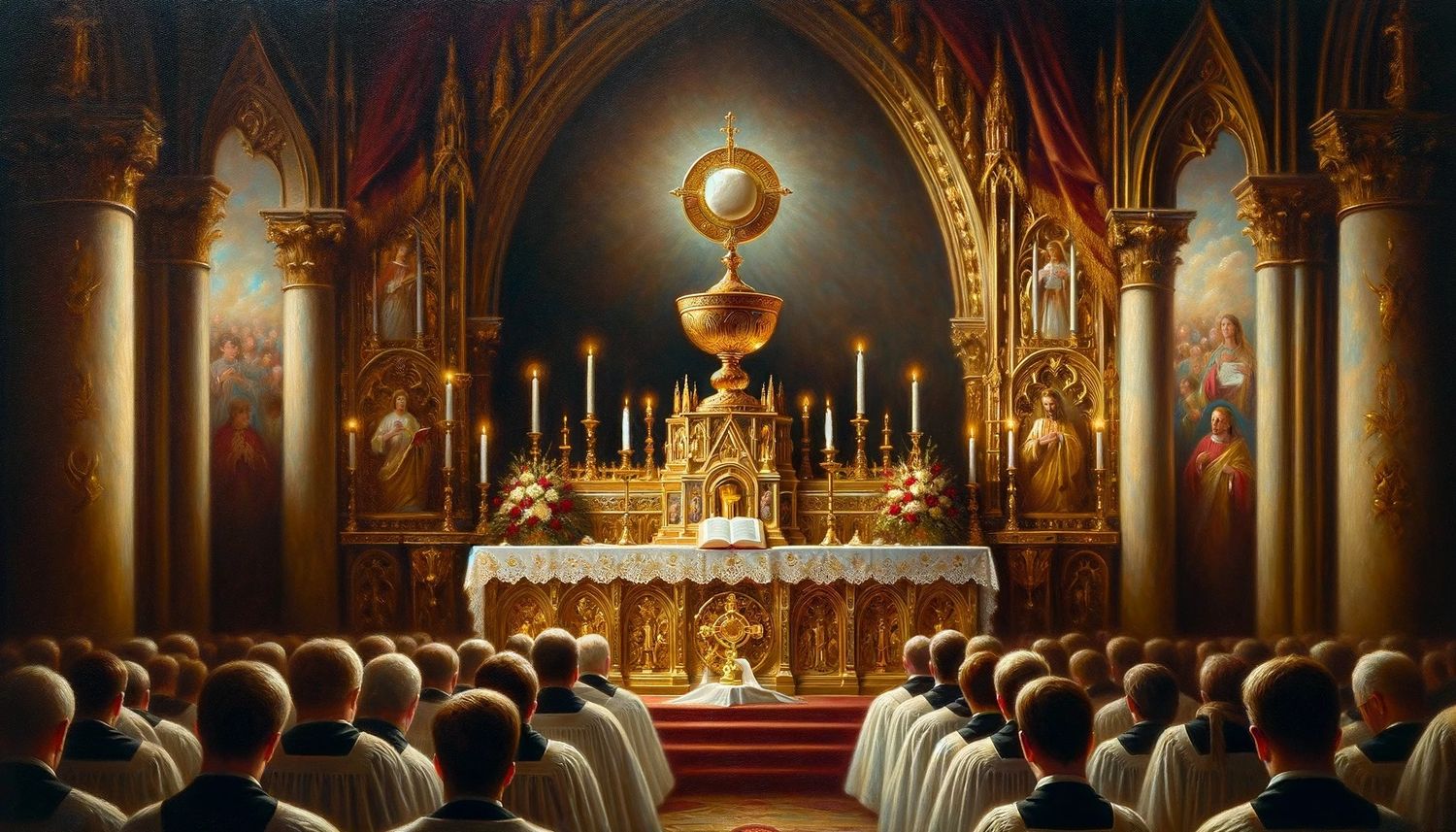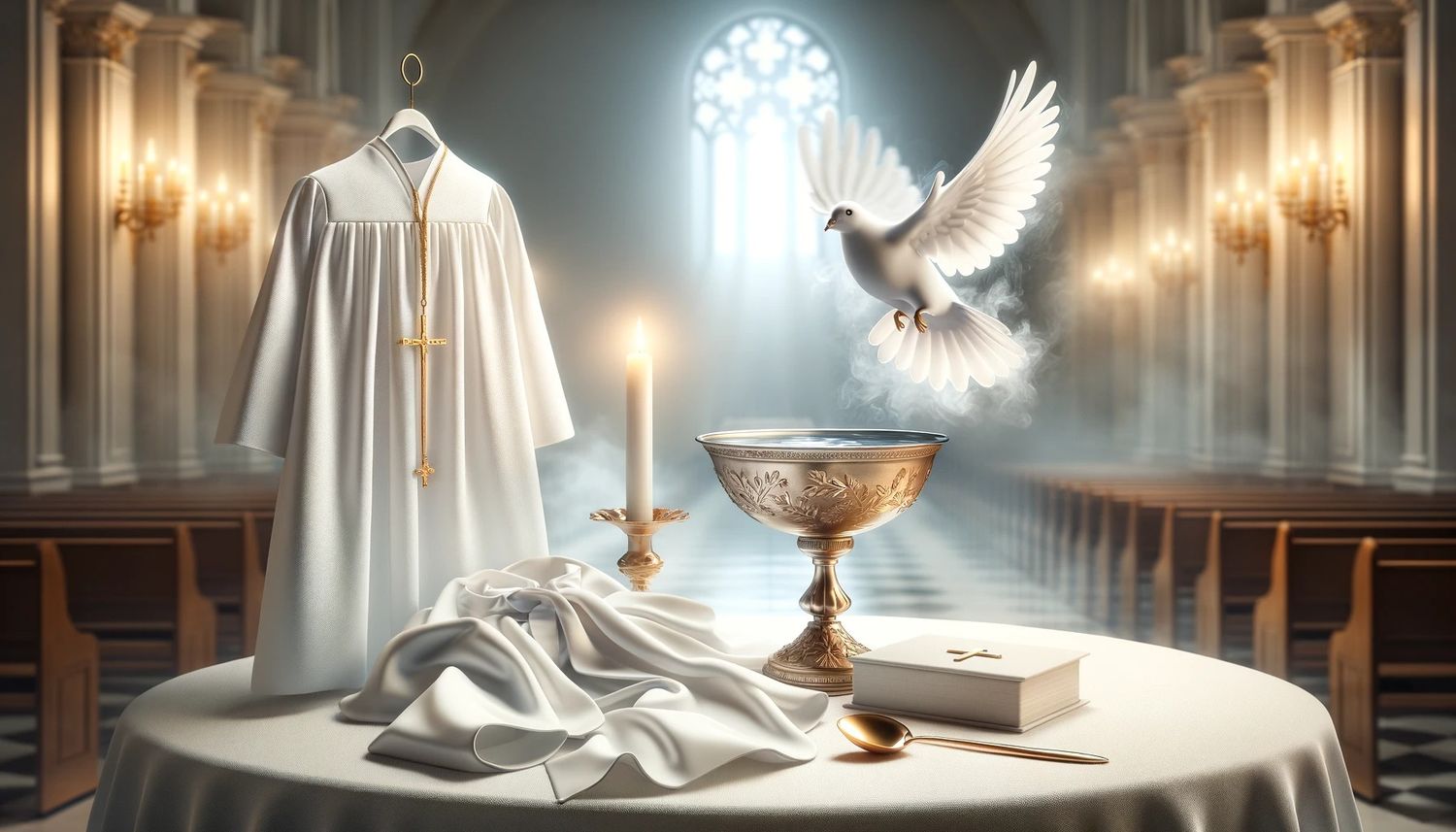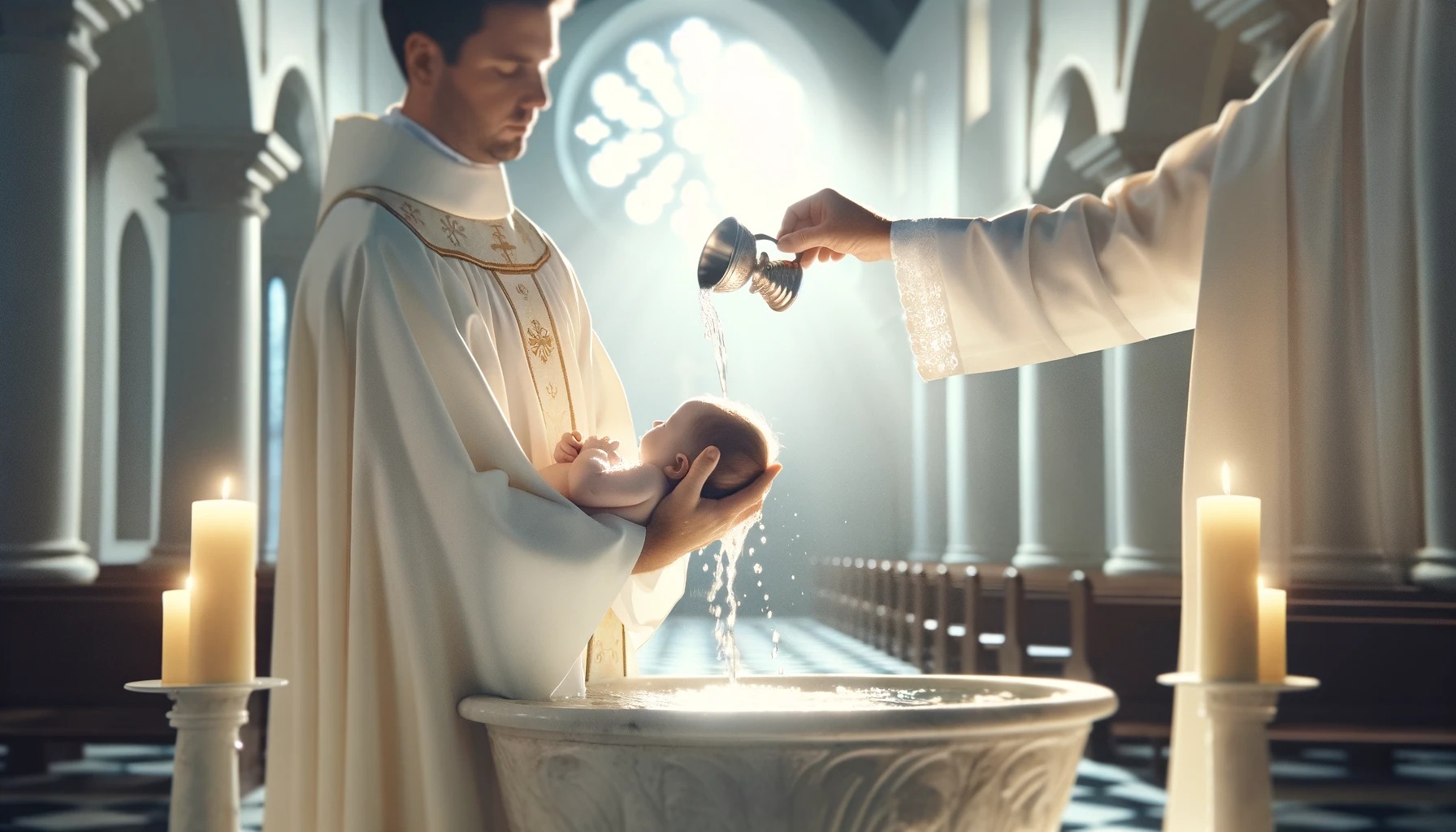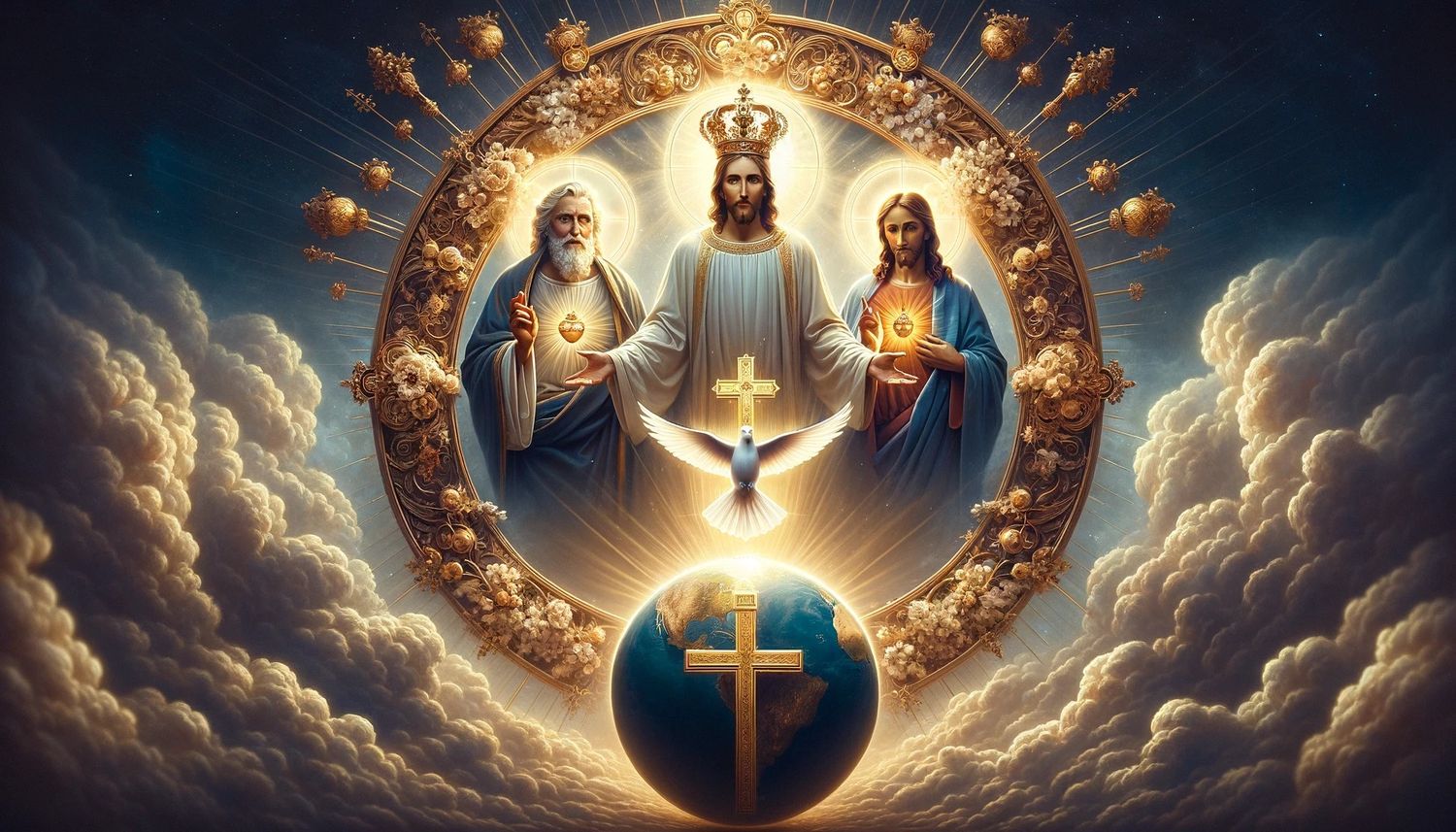Home>Theology and Spirituality>What Are The Seven Sacraments In Catholicism


Theology and Spirituality
What Are The Seven Sacraments In Catholicism
Published: February 18, 2024
Peter Smith, Editorial Director at Christian.net, combines deep insights into faith, politics, and culture to lead content creation that resonates widely. Awarded for his contributions to religious discourse, he previously headed a major organization for religious communicators, enhancing dialogue on faith's societal impacts.
Discover the significance of the seven sacraments in Catholic theology and spirituality. Explore their role in the faith and practice of the Catholic Church.
(Many of the links in this article redirect to a specific reviewed product. Your purchase of these products through affiliate links helps to generate commission for Christian.net, at no extra cost. Learn more)
Table of Contents
Introduction
In Catholicism, the seven sacraments are pivotal rites that mark significant milestones in a believer's spiritual journey. These sacred rituals serve as visible signs of God's grace, conveying profound spiritual truths and nurturing the faithful in their relationship with the divine. Each sacrament is a unique encounter with the living Christ, offering believers the opportunity to experience His presence in a tangible and transformative way.
The sacraments are deeply rooted in the teachings of Jesus Christ and have been upheld by the Catholic Church as essential channels of God's grace for centuries. They are not merely symbolic gestures but are believed to confer the grace they signify, strengthening and sanctifying the faithful as they navigate the complexities of human existence.
As we delve into the exploration of the seven sacraments, it is important to approach them with reverence and an open heart, recognizing their significance in the life of a Catholic believer. From the joyous celebration of Baptism to the solemn commitment of Matrimony, each sacrament holds a unique place in the spiritual tapestry of Catholicism, enriching the lives of the faithful and drawing them closer to the divine presence.
The sacraments serve as a testament to the enduring love and mercy of God, offering solace, guidance, and spiritual nourishment to those who partake in them. They are a source of comfort in times of trial, a beacon of hope in moments of despair, and a wellspring of grace that sustains believers on their journey of faith.
As we embark on this exploration of the seven sacraments, let us approach them with a sense of wonder and reverence, recognizing the profound impact they have had on the lives of countless individuals throughout history. Each sacrament is a sacred encounter with the divine, inviting believers to embrace the transformative power of God's grace and to walk in the footsteps of Christ with faith and devotion.
Read more: What Is The Form Of The Sacrament Of Baptism
Baptism
Baptism stands as the gateway to the Christian life, marking the beginning of one's journey in faith. In the Catholic tradition, this sacrament is celebrated with great joy and reverence, as it symbolizes spiritual rebirth and initiation into the body of Christ. The ritual of baptism involves the pouring of water over the individual's head or the immersion in water, signifying purification and the washing away of sin.
The significance of baptism is deeply rooted in the teachings of Jesus Christ, who Himself was baptized in the Jordan River by John the Baptist. This act not only serves as a model for believers but also demonstrates the essential nature of baptism in the Christian faith. Through baptism, individuals are cleansed of original sin and welcomed into the community of believers, becoming part of the Church, the mystical body of Christ.
Furthermore, baptism is a sacrament of initiation, laying the foundation for the Christian life and opening the door to the other sacraments. It is an act of faith, wherein the individual publicly professes their commitment to Christ and the Church. In the case of infant baptism, the child's parents and godparents make these promises on the child's behalf, pledging to raise them in the faith and nurture their spiritual growth.
The symbolism of water in baptism is profound, representing both cleansing and new life. Just as water cleanses the body, baptism cleanses the soul, washing away sin and imparting the grace of God. It also signifies the spiritual regeneration and renewal that occur through the indwelling of the Holy Spirit. The baptized individual is spiritually reborn, becoming a new creation in Christ and receiving the promise of eternal life.
In the Catholic tradition, baptism is a cause for celebration, as it marks the incorporation of the individual into the family of God. It is a sacrament of joy, as the community gathers to welcome the newly baptized member and offer support and prayers for their spiritual journey. The sacrament of baptism is a testament to the boundless love and mercy of God, inviting believers to embrace the gift of new life in Christ and embark on a lifelong journey of faith and discipleship.
Confirmation
Confirmation, also known as Chrismation in the Eastern Catholic and Orthodox traditions, is a sacrament that signifies the outpouring of the Holy Spirit upon the individual, empowering them to live out their faith with courage and conviction. In the Catholic Church, confirmation is regarded as one of the three sacraments of initiation, alongside baptism and the Eucharist, and is considered a crucial step in the spiritual journey of a believer.
The sacrament of confirmation is typically administered by a bishop, who lays hands on the individual and anoints them with chrism, a consecrated oil. This anointing is a visible sign of the seal of the Holy Spirit, marking the individual as a fully initiated member of the Church and imparting the gifts of the Holy Spirit. These gifts, including wisdom, understanding, counsel, fortitude, knowledge, piety, and fear of the Lord, are bestowed upon the recipient to strengthen and guide them in their Christian life.
Confirmation is rooted in the biblical accounts of the early Church, particularly in the book of Acts, where the apostles laid hands on believers, and they received the Holy Spirit. This tradition has been preserved and upheld in the Catholic Church, signifying the continuity of the apostolic faith and the transmission of spiritual authority from the apostles to the bishops.
The sacrament of confirmation is a profound affirmation of one's baptismal vows and a public declaration of faith. It represents a conscious and mature commitment to the beliefs and practices of the Catholic faith, as the individual takes ownership of their spiritual journey and embraces their role as a witness to Christ in the world.
In addition to its spiritual significance, confirmation also fosters a sense of unity and solidarity within the Church community. It serves as a communal celebration, wherein the entire congregation pledges support and prayers for those receiving the sacrament, acknowledging their role in nurturing and guiding the newly confirmed members in their faith.
Furthermore, confirmation equips individuals with the grace and strength needed to confront the challenges of living out their faith in a complex and often secular world. The gifts of the Holy Spirit, conferred during the sacrament, empower believers to bear witness to the Gospel, defend their beliefs, and actively participate in the mission of the Church.
In essence, confirmation is a sacred and transformative moment in the life of a Catholic believer, marking the deepening of their relationship with God and the Church. It is a celebration of faith, empowerment, and communal support, embodying the rich spiritual heritage of the Catholic tradition and inspiring individuals to embrace their calling as disciples of Christ.
Eucharist
The Eucharist, also known as the Holy Communion or the Lord's Supper, holds a central place in the life of the Catholic Church, representing the pinnacle of the sacramental journey. Rooted in the Last Supper, where Jesus instituted the sacrament, the Eucharist is a profound and sacred ritual that embodies the real presence of Christ in the consecrated bread and wine.
At the heart of the Eucharist lies the belief in transubstantiation, the transformation of the bread and wine into the body and blood of Christ. This miraculous change, brought about through the words of consecration spoken by the priest, is a testament to the profound mystery of faith, wherein the substance of the elements is transformed while their outward appearance remains unchanged.
The Eucharist is a sacrament of unity, symbolizing the communal bond among believers and their intimate connection with Christ. Through the reception of the Eucharist, Catholics partake in the very life of Christ, nourishing their souls and deepening their union with Him. This spiritual nourishment sustains and strengthens the faithful, equipping them to live out their faith with love and compassion.
Furthermore, the Eucharist is a memorial of Christ's sacrifice on the cross, wherein His body was broken and His blood was shed for the redemption of humanity. By partaking in the Eucharistic meal, believers enter into a profound communion with Christ, recalling His selfless love and offering gratitude for the gift of salvation.
The celebration of the Eucharist is a sacred and joyous occasion, wherein the faithful gather to participate in the liturgy, receive the body and blood of Christ, and offer prayers and thanksgiving. It is a moment of profound reverence and awe, as the Church community comes together to partake in the heavenly banquet and be nourished by the spiritual food that sustains their faith.
In essence, the Eucharist is the source and summit of the Catholic faith, embodying the living presence of Christ and the unity of the Church. It is a sacrament of profound mystery and profound grace, inviting believers to encounter the divine in a tangible and transformative way. Through the Eucharist, Catholics are drawn into communion with Christ and with one another, experiencing the boundless love and mercy of God in the sacred elements of bread and wine.
Penance
Penance, also known as the sacrament of reconciliation or confession, holds a significant place within the Catholic tradition, offering believers the opportunity for spiritual healing, forgiveness, and reconciliation with God and the Church. This sacrament acknowledges the reality of human frailty and sinfulness while affirming the boundless mercy and compassion of God.
The sacrament of penance encompasses several essential elements, beginning with contrition, wherein the individual acknowledges their sins with genuine sorrow and a firm resolve to amend their ways. This heartfelt contrition is the foundation of the sacrament, reflecting a sincere desire for spiritual renewal and reconciliation with God.
The next step in the sacrament of penance is the act of confession, wherein the individual articulates their sins to a priest in the sacred space of the confessional. This act of confession is not merely a recounting of wrongdoings but a humble and honest acknowledgment of one's failures and a willingness to seek guidance and absolution.
Following confession, the penitent receives absolution from the priest, who acts as a visible sign of Christ's mercy and forgiveness. Through the words of absolution, the priest grants pardon and reconciliation on behalf of Christ and the Church, imparting the grace of God and restoring the individual to a state of spiritual wholeness.
The final component of the sacrament of penance is satisfaction, wherein the penitent undertakes acts of penance or reparation as a tangible expression of their commitment to spiritual growth and renewal. These acts of penance, which may include prayers, charitable deeds, or other forms of restitution, serve as a means of demonstrating genuine contrition and a desire to make amends for past transgressions.
Penance is a sacrament of profound grace and healing, offering believers the opportunity to experience the transformative power of God's mercy in their lives. It is a sacrament of reconciliation, wherein the faithful are invited to lay bare their shortcomings and seek forgiveness, knowing that they will be met with compassion and understanding.
In essence, the sacrament of penance embodies the enduring love and forgiveness of God, providing a pathway to spiritual renewal and restoration. It is a sacred encounter with the mercy of Christ, inviting believers to embrace the gift of reconciliation and embark on a journey of healing and transformation. Through the sacrament of penance, Catholics are offered the assurance of God's unfailing love and the opportunity to experience the liberating joy of forgiveness and reconciliation.
Read more: What Is The Sacrament Of Communion
Anointing of the Sick
The sacrament of the Anointing of the Sick, also known as Last Rites or Extreme Unction, holds a profound significance within the Catholic tradition, offering spiritual strength and healing to those facing illness or the frailty of old age. This sacrament is a powerful expression of God's compassion and mercy, providing comfort and solace to the sick and infirm as they navigate the challenges of their condition.
Anointing of the Sick is rooted in the teachings and actions of Jesus Christ, who showed great compassion and care for the sick and suffering during His earthly ministry. The sacrament finds its scriptural basis in the Letter of James, which exhorts believers to call upon the elders of the church to pray over and anoint the sick with oil in the name of the Lord. This act of anointing is imbued with the grace of God, offering strength, courage, and spiritual healing to the individual in their time of need.
The sacrament of Anointing of the Sick is administered by a priest, who anoints the forehead and hands of the sick person with blessed oil, accompanied by prayers for healing and the forgiveness of sins. This anointing serves as a visible sign of God's grace and presence, bringing comfort and assurance to the individual as they confront the challenges of their illness or frailty.
Anointing of the Sick is not solely a sacrament of physical healing but encompasses the spiritual and emotional dimensions of suffering as well. It offers the sick person the grace to unite their suffering with the redemptive suffering of Christ, finding meaning and purpose in their affliction. Moreover, the sacrament provides the opportunity for the forgiveness of sins, bringing spiritual peace and reconciliation to the individual as they prepare to face the mystery of human mortality.
In addition to its significance for the individual receiving the sacrament, Anointing of the Sick also serves as a source of consolation and support for their loved ones and caregivers. It fosters a sense of communal prayer and solidarity, as the Church community gathers to intercede for the sick and offer spiritual comfort to those in need.
Anointing of the Sick is a sacrament of profound compassion and grace, embodying the loving presence of God amidst human suffering. It is a testament to the enduring care and concern of the Church for the sick and infirm, offering them the assurance of God's abiding love and the strength to face their challenges with faith and courage. Through the sacrament of Anointing of the Sick, Catholics are invited to embrace the healing touch of Christ and find hope and comfort in the midst of their trials.
Holy Orders
The sacrament of Holy Orders holds a sacred place within the Catholic Church, representing the conferral of spiritual authority and the commissioning of individuals to serve as ordained ministers. This sacrament, which includes the ordination of bishops, priests, and deacons, is deeply rooted in the apostolic tradition and is regarded as a continuation of the ministry established by Jesus Christ.
The sacrament of Holy Orders is a profound and solemn ritual, wherein the candidate is ordained by the laying on of hands and the prayer of consecration. Through this sacrament, the ordained minister is entrusted with the grace and authority to carry out the sacred duties of teaching, sanctifying, and shepherding the faithful. The ordination ceremony is a visible sign of the Church's recognition of the candidate's call to ministry and their commitment to serving God and the community.
The sacrament of Holy Orders is structured into three distinct degrees: the episcopate (bishops), the presbyterate (priests), and the diaconate (deacons). Each degree carries specific responsibilities and functions within the ecclesiastical hierarchy, reflecting the diverse roles of leadership and service in the life of the Church.
Bishops, as the successors of the apostles, are entrusted with the fullness of the sacrament of Holy Orders and are called to exercise pastoral oversight, teach the faith, and administer the sacraments within their dioceses. They serve as spiritual shepherds, providing guidance and governance to the clergy and the faithful, and are responsible for preserving the apostolic tradition and unity of the Church.
Priests, who are ordained to the presbyterate, are called to collaborate with and assist the bishops in their pastoral ministry. They are empowered to celebrate the sacraments, preach the Gospel, and provide spiritual care and guidance to the faithful. Priests play a vital role in nurturing the spiritual life of the community and are entrusted with the sacred task of representing Christ in their service to the Church.
Deacons, ordained to the diaconate, are called to serve the Church in a ministry of charity and assistance. They are tasked with proclaiming the Gospel, assisting in the liturgy, and engaging in works of mercy and social justice. Deacons embody the servant-leadership model established by Christ, exemplifying humility and selfless dedication in their ministry to the marginalized and vulnerable.
The sacrament of Holy Orders is a testament to the continuity of the apostolic ministry and the enduring presence of Christ in the life of the Church. It serves as a visible sign of God's grace and guidance, equipping ordained ministers with the spiritual gifts and authority needed to shepherd and serve the people of God. Through the sacrament of Holy Orders, the Church continues to fulfill its mission of proclaiming the Gospel, celebrating the sacraments, and shepherding the faithful in the footsteps of Christ.
Matrimony
Matrimony, also known as the sacrament of marriage, holds a sacred and revered position within the Catholic tradition, signifying the union of a man and a woman in a lifelong covenant of love and fidelity. This sacrament is deeply rooted in the teachings of Jesus Christ, who elevated marriage to a sacred institution, affirming its indissolubility and its reflection of the divine union between Christ and the Church.
The sacrament of Matrimony is a profound and solemn ritual, wherein the couple enters into a covenant before God and the Church, pledging to love, honor, and cherish one another in all circumstances. This covenant is sealed with vows of commitment and fidelity, embodying the sacrificial love and mutual self-giving that are foundational to the marital bond.
In the Catholic understanding, marriage is not merely a social contract but a sacred vocation, wherein the couple is called to mirror the love of Christ for His Church. The sacrament of Matrimony confers grace upon the couple, empowering them to live out their vocation with faith, love, and perseverance. This grace sustains the couple in their journey of mutual sanctification, fostering unity, forgiveness, and the fruitfulness of their union.
The sacrament of Matrimony is a celebration of love, unity, and the sanctity of family life. It is a joyful occasion wherein the couple, surrounded by their loved ones and the faith community, exchanges vows of lifelong fidelity and receives the blessing of the Church. This celebration reflects the sacredness of the marital bond and the communal support and prayers offered for the couple as they embark on their shared journey.
Furthermore, the sacrament of Matrimony is a source of grace and strength for the couple as they navigate the joys and challenges of married life. It provides the couple with the spiritual resources needed to build a loving and enduring relationship, rooted in faith, mutual respect, and selfless love. The grace of the sacrament sustains the couple in times of trial, enriches their joys, and enables them to fulfill their vocation as spouses and parents.
In essence, the sacrament of Matrimony embodies the divine plan for marriage, offering couples the grace and guidance to build a loving and enduring union. It is a testament to the sacredness of marriage, the sanctity of family life, and the enduring love and fidelity that are at the heart of the marital covenant. Through the sacrament of Matrimony, couples are invited to embrace the grace of God and to build their lives upon the firm foundation of faith, love, and mutual self-giving.
Conclusion
The seven sacraments of Catholicism represent the profound intersection of divine grace and human experience, offering believers a tangible encounter with the transformative power of God's love. From the initiation into the Christian faith through Baptism to the lifelong commitment of Matrimony, each sacrament serves as a sacred conduit through which believers receive the grace and guidance needed to navigate the complexities of life.
These sacraments are not mere rituals but are deeply embedded in the teachings of Jesus Christ and the apostolic tradition, embodying the enduring presence of the divine in the lives of believers. They serve as visible signs of God's boundless love and mercy, offering solace, healing, and spiritual nourishment to those who partake in them.
The sacraments also foster a sense of communal unity and support, drawing believers into a deeper relationship with God and with one another. They are moments of communal celebration, wherein the faith community gathers to offer prayers, support, and encouragement to those receiving the sacraments, affirming their shared journey of faith and discipleship.
Furthermore, the sacraments are a testament to the enduring relevance of the Catholic tradition, providing believers with a framework for encountering the divine in the midst of everyday life. They are a source of strength and guidance, equipping believers to face the challenges of the world with faith, hope, and resilience.
In essence, the seven sacraments of Catholicism stand as a testament to the enduring love and presence of God in the lives of believers. They are sacred encounters with the divine, inviting individuals to embrace the transformative power of God's grace and to walk in the footsteps of Christ with faith and devotion. As believers partake in these sacraments, they are reminded of the profound truth that God is intimately involved in every aspect of human existence, offering guidance, healing, and hope to all who seek Him.
The sacraments are a testament to the enduring love and mercy of God, inviting believers to embrace the gift of new life in Christ and embark on a lifelong journey of faith and discipleship. Through the sacraments, believers are invited to encounter the divine in a tangible and transformative way, drawing them into communion with Christ and with one another.














